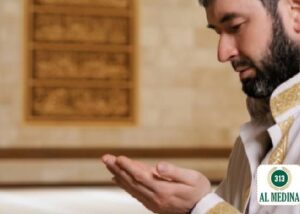Quran
Hadith
Islamic Text
Yes, there is a Hadith about Dua on Friday (Jummah) being accepted. It is in Sahih al-Bukhari. It mentions a particular time of day. In Abi Dawood it is clarified as being the last period after Asr.
عَنْ أَبِي هُرَيْرَةَ: أَنَّ رَسُولَ اللَّهِ صَلَّى اللهُ عَلَيْهِ وَسَلَّمَ ذَكَرَ يَوْمَ الجُمُعَةِ، فَقَالَ: فِيهِ سَاعَةٌ، لاَ يُوَافِقُهَا عَبْدٌ مُسْلِمٌ، وَهُوَ قَائِمٌ يُصَلِّي، يَسْأَلُ اللَّهَ تَعَالَى شَيْئًا، إِلَّا أَعْطَاهُ إِيَّاهُ. وَأَشَارَ بِيَدِهِ يُقَلِّلُهَا
On the authority of Abi Hurairah, may Allah (Most High) be pleased with him, that the Messenger of Allah ﷺ mentioned the day of Jummah (Friday) and then said: ‘In it is an hour, if a Muslim asks Allah (Most High) for something, coinciding with it, whilst he is praying, then He (Most High) will definitely give it to him.’ Then he ﷺ indicated its briefness with his hand. (Sahih al-Bukhari, 935).
In the Sahih Hadith above, the Holy Prophet ﷺ mentioned that there is a period of time on the day of Jummah (Friday), in which Dua (supplication) is accepted. However, the particular period of time was not specified in this Hadith narration. Rather the clarification is provided in the following Hadith from the Sunan of Abi Dawood. It clarifies that the specific time is the period before Maghrib.
عَنْ جَابِرِ بْنِ عَبْدِ اللَّهِ، عَنْ رَسُولِ اللَّهِ صَلَّى اللهُ عَلَيْهِ وَسَلَّمَ أَنَّهُ قَالَ: يَوْمُ الْجُمُعَةِ ثِنْتَا عَشْرَةَ – يُرِيدُ – سَاعَةً، لَا يُوجَدُ مُسْلِمٌ يَسْأَلُ اللَّهَ عَزَّ وَجَلَّ شَيْئًا، إِلاَّ آتَاهُ اللَّهُ عَزَّ وَجَلَّ، فَالْتَمِسُوهَا آخِرَ سَاعَةٍ بَعْدَ الْعَصْرِ
On the authority of Jabir, may Allah (Most High) be pleased with him, that the Messenger of Allah ﷺ said, ‘Friday is divided into twelve (he meant hours) (therein is an hour) no Muslim asks Allah (Glorified and Exalted is He) for something, except that He (Glorified and Exalted is He) grants it to him. So, seek it in the final hour after Asr.’ (Abu Dawood, 1048).
This Hadith in Abi Dawood has a Sahih chain according to leading scholars of Hadith. Therefore, the specification of the time being the period before Maghrib is established in authentic Hadith. So the Hadith narration in Sahih al-Bukhari, which does not specify, should be understood in light of this narration.
وَقَدْ ثَبَتَ عَنْ جَابِرٍ عَنْ النَّبِيِّ صَلَّى اللَّهُ عَلَيْهِ وَسَلَّمَ قَالَ: يوم الْجُمُعَةِ ثِنْتَا عَشْرَةَ سَاعَةً لَا يُوجَدُ مُسْلِمٌ يَسْأَلُ اللَّهَ شَيْئًا إلَّا آتَاهُ اللَّهَ عَزَّ وَجَلَّ فَالْتَمِسُوهَا آخِرَ سَاعَةٍ بَعْدَ الْعَصْرِ. رَوَاهُ أَبُو دَاوُد وَالنَّسَائِيِّ بِهَذِهِ الْحُرُوفِ بِإِسْنَادٍ صَحِيحٍ. (المجموع شرح المهذب)
And it was established on the authority of Jabir, from the Messenger of Allah ﷺ: ‘Friday is divided into twelve (he meant hours) (therein is an hour) no Muslim asks Allah (Glorified and Exalted is He) for something, except that He (Glorified and Exalted is He) grants it to him. So, seek it in the final hour after Asr.’ Abu Dawud and al-Nasai narrated it with this wording with a Sahih chain. (Imam al-Nawawi, al-Majmoo).
خرَّجه أبو داود والنسائي بإسناد كلهم ثقاتٌ. (فتح الباري شرح صحيح البخاري)
It was narrated by Abu Dawud and al-Nasai, with a chain in which all the narrators are trustworthy. (Imam Ibn Rajab al-Hanbali, Fath al-Bari).
May Allah Most High bless us all with the Towfeeq to take advantage of such blessings, and allow us to remain constant in Dhikr.
And Allah Most High Knows Best.
-Answered by Shaykh Noorud-deen Rashid (08.07.2022)
-With special thanks to Sidi Yusuf Asghar for assisting with Nusoos translation
See also:
Are there specific virtues regarding the Day of Jumu’ah?
Hadith about specific reward for reciting Darood Sharif on Friday.
See also video:






